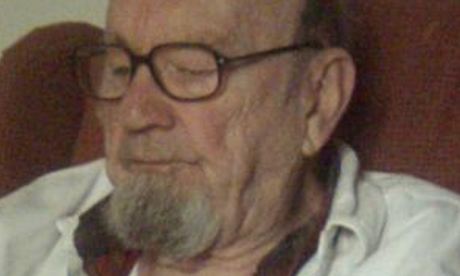
My husband, Arlo Tatum, who has died aged 91, was a singer and peace activist. He was jailed twice in his native US for refusing to go to war. It was under his leadership that the Central Committee for Conscientious Objectors counselled thousands of men – among them Arlo Guthrie and Muhammad Ali.
Arlo was born into a Quaker family in Iowa and attended William Penn College, Oskaloosa. In 1941, at 18, he was expected to register for the draft. As an absolutist with deeply held beliefs he would not, and he wrote to the US attorney general announcing his intention to refuse. He was sentenced to three-and-a-half years' imprisonment at the Federal Correctional Institution at Sandstone, Minnesota. He was its youngest prisoner.
Arlo had a fine bass-baritone voice and was awarded a scholarship to study at the American Conservatory of Music. After winning a competition to sing with the Chicago Symphony Orchestra, he launched into a career as a soloist with the Chicago Concert and Opera Guild.
In 1948, a new draft law came in and Arlo again refused to register. There was another term in prison. Upon release he resumed his singing, but in 1951 this life came to an end when he was seriously injured in a car and train crash. He was not expected to live, but after months recovering in hospital, he started to build a new life and became co-executive secretary of the War Resisters League. In 1955, he moved to London to be general secretary of War Resisters' International. He wrote peace and protest songs, some for the Aldermaston marches. He was a director of Peace News and started the World Peace Brigade.
I met him in London, and we married. We moved to Philadelphia when he was appointed executive secretary of the Central Committee for Conscientious Objectors. Ten years of intense activity ensued during the war in Vietnam. Under his leadership, CCCO advised attorneys and counselled men. Arlo undertook speaking tours across the US and testified before a senate sub-committee chaired by Edward Kennedy.
In 1972, CCCO sued the US government over the army's surveillance of peaceful civilian political activity; the case was won on appeal, but overturned in the supreme court. The case of Laird v Tatum is well known in US law circles.
We returned to London and Arlo became a council member of the Peace Pledge Union, serving as its chairman from 1978 to 1981. He managed the Circle Trust Club for ex-offenders, finding his own experience of prison helpful in this work.
After retiring to Cornwall, he enjoyed his singing. His final public appearance was at a Christmas concert, when, at the age of 90, he sang Mighty Lord from Bach's Christmas Oratorio.
He is survived by me, our twin daughters, Janet and Sarah, and two grandchildren.

